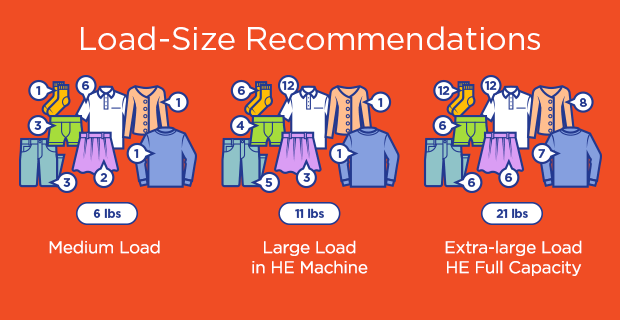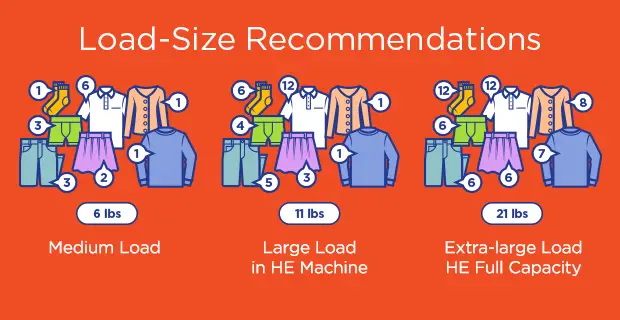Do you ever wonder how much your laundry weighs? Whether you’re lugging your clothes to the laundromat or just curious about the weight of your weekly laundry, you may be surprised to learn how much it actually weighs.
While it may seem like a trivial question, knowing the weight of your laundry can actually be quite useful. From calculating detergent usage to preventing strain on your washing machine, understanding the weight of your laundry can help make laundry day a little easier. So, let’s dive in and discover just how much one load of laundry weighs.
Average weight of one load of laundry is around 8-10 pounds (3.6-4.5 kg). However, the weight can vary depending on the type of clothing, size of the load, and water content. A full load of towels or jeans will weigh more than a full load of t-shirts or socks. It’s important not to overload your washing machine to avoid damage to the machine and to ensure proper cleaning.

How Much Does One Load of Laundry Weigh?
Doing laundry is an essential household chore that most of us do on a regular basis. However, have you ever wondered how much your laundry weighs? The weight of your laundry can vary depending on the size of your washing machine, the type of fabric, and the number of clothes you put in. This article will provide you with an in-depth analysis of how much a typical load of laundry weighs.
The Average Weight of a Laundry Load
The weight of a laundry load can vary depending on several factors. However, on average, a typical load of laundry weighs around 8-10 pounds. This weight includes the weight of the clothes, water, and detergent.
When it comes to washing machine sizes, a standard top-loading washing machine can hold up to 12-16 pounds of laundry. On the other hand, a standard front-loading washing machine can hold up to 20-22 pounds of laundry. However, it is important to note that overloading your washing machine can cause damage to the machine and may not clean your clothes effectively.
Factors That Affect the Weight of a Laundry Load
Several factors can affect the weight of a laundry load. Some of these factors include:
- Size of the clothes
- Type of fabric
- Amount of water used
- Amount of detergent used
The size of the clothes can greatly affect the weight of a laundry load. For example, a load of baby clothes will weigh less than a load of adult clothes. Similarly, a load of towels will weigh more than a load of t-shirts.
The type of fabric can also affect the weight of a laundry load. Clothes made of heavier fabrics such as denim or wool will weigh more than clothes made of lighter fabrics such as cotton or silk.
The amount of water and detergent used can also affect the weight of a laundry load. A load with more water and detergent will weigh more than a load with less water and detergent.
The Benefits of Knowing the Weight of Your Laundry Load
Knowing the weight of your laundry load can be beneficial in several ways. Firstly, it can help you determine how much detergent to use. Using too much detergent can result in excess suds, which can cause damage to your washing machine and clothes. Using too little detergent can result in clothes that are not properly cleaned.
Additionally, knowing the weight of your laundry load can help you save money on energy bills. Overloading your washing machine can cause it to work harder and use more energy. By knowing the weight of your laundry load, you can ensure that you are not overloading your machine and using more energy than necessary.
The Importance of Properly Loading Your Washing Machine
Properly loading your washing machine is essential to ensure that your clothes are properly cleaned and your machine is not damaged. Overloading your washing machine can cause damage to the machine and may not clean your clothes effectively. On the other hand, underloading your washing machine can waste water and energy.
When loading your washing machine, make sure to evenly distribute your clothes throughout the machine. Avoid overloading the machine and ensure that there is enough water and detergent for the weight of your laundry load.
The Verdict: How Much Does One Load of Laundry Weigh?
In conclusion, the weight of a laundry load can vary depending on several factors, including the size of the clothes, the type of fabric, and the amount of water and detergent used. On average, a typical load of laundry weighs around 8-10 pounds. Knowing the weight of your laundry load can be beneficial in several ways, including saving money on energy bills and ensuring that your clothes are properly cleaned. Properly loading your washing machine is also essential to ensure that your clothes are properly cleaned and your machine is not damaged.
Frequently Asked Questions
Laundry can be a daunting task, especially if you’re not sure how much weight your washing machine can handle. Here are some frequently asked questions about laundry weight to help you out.
How much does one load of laundry weigh?
The weight of a load of laundry varies depending on a few factors. These factors include the type of fabric, the size of the load, and the water content. On average, a small load of laundry weighs around 4-6 pounds, while a larger load can weigh up to 12-15 pounds.
It’s important to note that overloading your washing machine can cause damage to the machine and affect the quality of your clothes. Be sure to check your washing machine’s manual for the recommended weight capacity before loading it up.
How do I weigh my laundry?
If you’re curious about the weight of your laundry, there are a few ways to measure it. One method is to use a bathroom scale. Simply weigh yourself first, then weigh yourself while holding the laundry basket. The difference between the two weights is the weight of the laundry.
Another method is to use a luggage scale. Hang the laundry basket from the scale and lift it off the ground. The weight displayed on the scale is the weight of the laundry.
What’s the weight limit of a typical washing machine?
The weight limit of a washing machine varies depending on the model and brand. In general, most washing machines have a weight limit of around 10-12 pounds for a standard top-loading machine and around 20-25 pounds for a front-loading machine. It’s important to check your washing machine’s manual for the recommended weight capacity to avoid overloading the machine and causing damage.
It’s also worth noting that the weight capacity of a washing machine doesn’t necessarily mean that you should always wash that much laundry at once. Overloading the machine can result in uneven cleaning and potentially damage the machine.
How does the type of fabric affect the weight of the laundry?
The weight of a load of laundry can be affected by the type of fabric being washed. For example, cotton tends to be heavier than synthetic materials. Additionally, heavier fabrics such as denim or towels will weigh more than lighter fabrics like t-shirts or socks.
It’s important to take into account the weight of the fabric when loading your washing machine to avoid overloading it and causing damage.
Why is it important to know how much your laundry weighs?
Knowing the weight of your laundry can help you avoid overloading your washing machine and causing damage. It can also help you determine the appropriate amount of detergent to use for each load, which can save you money in the long run.
In addition, knowing the weight of your laundry can help you optimize your laundry routine and ensure that your clothes are being washed properly and effectively.
Laundry 101: Washing Machine Capacity and Load Size Guide
In conclusion, determining the weight of one load of laundry can be a useful piece of information for a variety of reasons. Not only can it help you properly load your washing machine and avoid overloading it, but it can also assist in calculating the cost of laundry services or detergents.
By taking the time to weigh your laundry before washing, you can ensure that you are using the appropriate amount of detergent and water, which can save you money over time. Additionally, understanding the weight of your laundry can also help you make more informed decisions about the type of washing machine you need and how often you should do laundry.
Overall, while the weight of one load of laundry may seem like a small detail, it can have a significant impact on your day-to-day life. By keeping this information in mind, you can make more efficient and cost-effective choices when it comes to doing your laundry.

